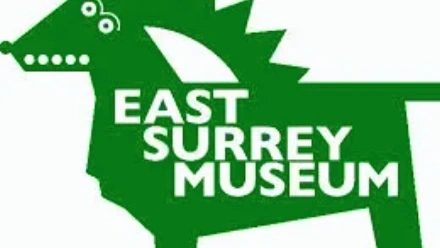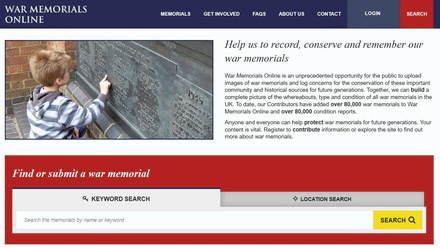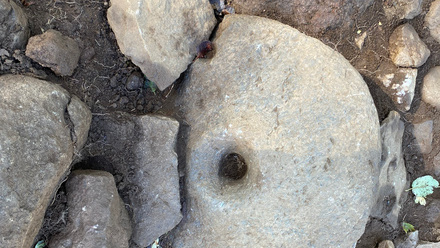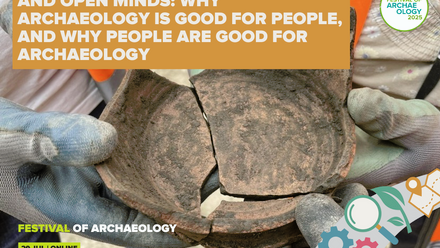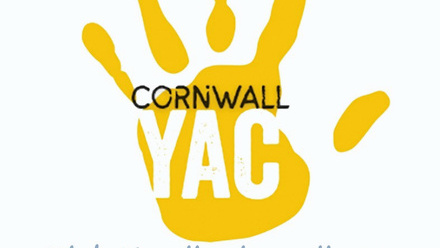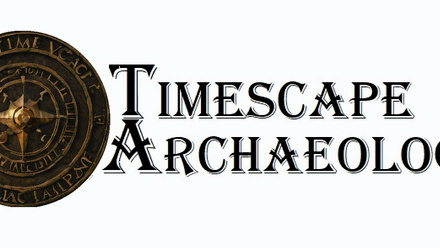It's the big question what do we and what does our profession do for society beyond preservation and investigation of the past? What do we actually contribute to the betterment of society? Some say we slow down planning, cost money and do little more than stock museums, but the truth is our contribution to society is so much more than that. So as a PhD student, I want to share with you just how archaeology contributes to society, and celebrate our wonderfully diverse profession where our jobs, despite being archaeologists, are rarely the same. This is not a day in the life of just myself, but I hope represents a day in the life of many.
Firstly, our main role is within planning. Archaeological investigation is a legal requirement within the National Planning Policy Framework (NPPF) to ensure archaeological evidence is not destroyed, is recorded and, where possible, further preserve. Without this legality, for instance, we would not have seen the most recent chariot burials in East Yorkshire (https://archaeology.co.uk/articles/news/further-chariot-burial-discovered-at-pocklington.htm), or the Roman period buildings in Scarborough that appear to be unique in the Empire (https://historicengland.org.uk/whats-new/in-your-area/yorkshire/roman-remains-discovery-scarborough/). But there are more serious implications too. Without said planning policy and infrastructure, we have to ask what would have happened to the tens of thousands of human remains that were moved to make way for large projects such as those of the Olympic Park and HS2. Sometimes, our role literally means we are caretakers of the dead, to make sure they are treated with dignity.
A smaller but more intense role of archaeology is also in fighting crime. Forensic archaeology provides the tools by which to recover murder victims who have been buried, from using geophysical equipment to locate potential targets to making sure the graves are meticulously excavated to make sure every single piece of evidence is accounted for. The work is non-stop, highly painstaking and highly pressured, and professional witness testimonies are crucial within the courts and must stand up to cross-examination, where even one spelling mistake will be counted by the defence as an opportunity to attack your integrity and professionalism. The most recent example of this is the recent search for more of the serial killer Fred Wests victims (https://www.gloucestershirelive.co.uk/news/gloucester-news/live-fred-west-clean-plate-5426346).
Archaeology degrees themselves also provide a huge variety of transferable skills to the wider economy. The degrees aren't about being able to identify a hundred different types of pottery from a glance, but about discerning the human condition to be able to understand ourselves as a species better. We are forever trying to understand why we act the way we do. Investigations can be heavily grounded in scientific techniques (genetics, isotopes, landscape studies), but also contain more theoretical and discussion based methods which help address many issues that are also very relevant today (identity, gender studies, concepts of childhood). This means we have a wealth of social and technical skills which can be applied to other areas of society.
It means we also deal with some very uncomfortable topics too, like death and dying. The Continuing Bonds project, for instance, used archaeological case studies to help increase the confidence of modern practitioners when talking about death (https://spcare.bmj.com/content/bmjspcare/9/2/229.full.pdf). With our colleagues in archives we also provide uncomfortable stings of truth about our past to balance idyllic views, such as revealing the role of the Slave Trade and how money from it funded some of the grandest country homes within England's Green and Pleasant lands. In this instance, there was clear outrage from the public in the changing of this once fairytale perception with historical truth (https://www.nationaltrust.org.uk/features/addressing-the-histories-of-slavery-and-colonialism-at-the-national-trust). As archaeologists, we are impartial scientists and custodians of the national history, and we have a responsibility towards that.
Such responsibilities also fall on new genetic evidence, which we aim to protect from mis-use by political agendas. I encourage you to search out what happened when the possibility emerged that Cheddar Man, some of the oldest human remains in Britain, may have been dark skinned. It led to outrage by some, and abuse being levelled at archaeologists and researchers. You can find a summary of the situation here https://twitter.com/Tess_Machling/status/1357265246902231046. If you wish to explore further consequences as to what happens when archaeological data is misused, then I also encourage you to research the role of Gustaf Kossina and his followers in Nazi Germany in the 1930's and 1940's. The warnings from history are there, and they are clear. In an increasingly fractious modern British society, protection against such misuse of archaeological data is arguably more important now than ever.
But what's more, the process of archaeological investigations in their own right can be a tool for good. Operation Nightingale is perhaps the most famous example of this, using archaeology as a means of recovery and rehabilitation for veterans of military service (https://www.wessexarch.co.uk/our-work/operation-nightingale). Archaeology also has infinite potential to address both local and wider social issues. In one example, learning about farming and food can help encourage healthy eating at home (see Moshenka and Dhanjal Community Archaeology Theories Methods and Practice 2011). Even facilitating a nine-to-five working day can help get people get back into routines by which to help rebuild their lives, as encouraged by the drug rehabilitation MERLIN project in Castleford (unfortunately, all online information about this project has since disappeared). I thoroughly recommend you have a look at the raft of open access articles within the Journal of Community Archaeology and Heritage (https://www.tandfonline.com/action/showOpenAccess?journalCode=ycah20). See how community archaeology around the world differs depending on the specific social and cultural constructs of different societies. But more importantly, see what is achievable socially, as well as archaeologically. Such achievements include achieving a pride of place, social cohesion, area renovation and mental health support within multicultural and multi-vocal contexts.
Many of us also accept that as a discipline, we also have something of an image problem. The reality is that we are a relatively diverse group of people, but we want to increase that diversity even more (particularly in academia). We're not all from the same middle class, secure backgrounds. For instance, I'm a lass from Batley (W. Yorkshire), my mum was a secretary, my Dad was a breakdown recovery driver and I was the first in my family to go to university. I'm dyspraxic (find out more https://dyspraxiafoundation.co.uk/), which means I sometimes struggle with even basic social skills. I got into archaeology through a community project by pure fluke (you can see it here http://www.fomp.co.uk/html/survey.htm.
So our contribution to society as a profession, therefore, is much more varied and wide ranging than most people perhaps realise. The impact we have can be life changing. What is also clear, however, is that there is also a much greater potential out there, ready to be tapped into. But this means we have to deal with something that we sometimes struggle with, and that's celebrating our work with non-specialist audiences. The cancellation of shows like Time Team certainly haven't helped in bringing archaeology to the masses. This is why movements such as the Archaeopress Open Access series are so important in being able to share cutting edge research with a much wider variety of audience (see https://www.archaeopress.com/ArchaeopressShop/Public/defaultAll.asp?OpenAccess=Y&intro=true). We must also find other ways by which to make up that shortfall of public representation.
So where do we find ourselves as a profession now? With looming threats to planning policy, as well as battling with an unfit Treasure Act, in addition to departmental closures, as a discipline in Britain we are at a vital crossroads. The Dig4Archaeology campaign (https://www.dig4arch.co.uk/) has taken up the banner in championing our discipline and what it can provide, but it cannot do it alone. It needs all aspects of the profession, and those of community based research, to come together to support our wonderful discipline.
So currently my day in a life of archaeology, with many, is watching those at the forefront of our discipline navigate these difficult waters for our discipline, and doing what I can whilst completing my PhD, in the hope that there will be a place for me to continue within our sector, whilst continuing where I can to support community archaeology through the Roman Roads Research Association (http://www.romanroads.org/) and projects such as Petuaria Revisited (https://www.facebook.com/petuaria), to further demonstrate archaeology's importance and potential to society.
This blog originally started as a Twitter post on the account @MattockInHand, which was further turned into a feature article in The Pipeline News 7/7/21 (http://thepipeline.info/blog/2021/07/07/so-it-begins-a-personal-view-of-uk-archaeology/).
Contact details
Reb Ellis
University of Hull

